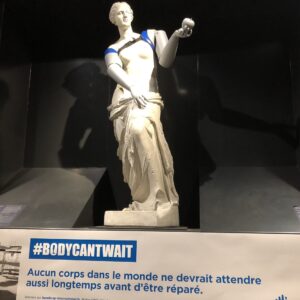We live in tough times. Contemporary challenges require us to find new and imaginative solutions. Using the past to think about the present is one such path forward. Classical Reception can provide us with new ways to think about these problematic issues. A recently published collection, edited by Anastasia Bakogianni and Luis Unceta Gómez, and titled Classical Reception: New Challenges in a Changing World (De Gruyter, 2024), demonstrates the potential of the field to offer solutions. This edited volume, featuring an international cast of scholars, poses answers from a variety of approaches and disciplinary areas (Adaptation Studies, Disability Studies, Film Studies, Performance Studies, Translation Studies, Modern Greek Studies and popular receptions). Issues of race, gender, inclusivity, technology, and pedagogy are explored through the lens of the ancient world and its reception.
Each chapter engages with the question of how to marshal the classical past in our efforts to respond to modern challenges. Overall, the collection interrogates the limits of classical reception as both a local and a global phenomenon. On the one hand, many chapters widen, and deepen our engagement with popular media, such as films, manga, or video games and other kinds of technology mediated receptions. They all share an interest in the special methodological needs posed by popular culture receptions and focus on different challenges that Classical Reception Studies must face when dealing with contemporary cultural artifacts, that contest the traditional views on classical reception phenomena. In the same vein, well-stablished methodologies, such as archival research are also called into question and re-examined.
Another group of chapters in our collection analyse how classical receptions respond to contemporary societal concerns, such as gender, race, ideological hierarchies, or disability, and how the field is now producing more socially engaged responses to contemporary challenges, including pedagogical responses to these issues that embrace diversity and foster inclusion. The importance of technology, accelerated during the COVID-19 health emergency and now in the post-pandemic world, is also addressed in other chapters, that clearly show how both our research in Classical Reception Studies and the classical receptions of our era are to a large extent embedded in different technologies.

The volume is divided into six sections that cover these contemporary challenges in Classical Reception scholarship. Section one, “Re-Thinking Classical Reception”, includes three chapters by Jesse Weiner, Luis Unceta Gómez, and Anastasia Bakogianni where theoretical concerns come to the fore. These chapters put forward new conceptual and methodological frameworks, illustrated with the analysis of a number of popular culture creations.
The second section, “Working with Archives”, demonstrates the ongoing importance of archival research, both in physical and digital archives. To fully explore specific receptions certain case studies, necessitate that scholars engage in archival work, but the ways and reasons why we carry out such work have been evolving. This section includes chapters by Alena Sarkissian, Gonda Van Steen, and Michael Williams.
“Cultural Intersections”, the third section includes three chapters by Konstantinos P. Nikoloutsos, Zina Giannopoulou, and a co-authored piece by Amanda Potter and Guendalina D. M. Taietti. These different kinds of intersections help us analyse the crossroads of Classics and other cultural milieus, and deals with non-canonical, decentred and/or disruptive receptions of antiquity. Two of the chapters discuss cross-media classical receptions (film, manga/comics), as well as cross-cultural phenomena (Latin America and Japan interacting with European/North American culture). The third challenges the very relationship between past and present that forms the basis of classical reception.
In section four, “Forming and Re-negotiating Identities”, three chapters by Amanda Kubic, T.H.M. Gellar-Goad & Caitlin Hines, and Martina Treu, demonstrate how our field has responded to both urgent societal challenges, such as disability, as well as older, ongoing questions about the place and function of the classical past in the creation of modern identities. Rather than avoiding difficult issues, Classical Reception scholars have worked hard to ensure that our subject is involved in these conversations and is actively seeking to become more inclusive in terms of its research, pedagogy and its performative practice.
The fifth section, “Greek Tragedy in a Time of Pandemic”, investigates how theatre practitioners discovered new ways to continue to teach and perform Greek tragedy even during the COVID-19 pandemic, with reference to two examples, one from the United States analysed by Meryem Deniz and one from New Zealand examined by Anastasia Bakogianni and Declan Patrick. Making a virtue out of necessity, these practitioners, students, and their teachers, like countless others around the world, found ways to overcome the challenges of teaching, studying, and performing theatre by embracing technology.
In the last section, “Engaging with Technology and the Wider Public”, two chapters forcefully demonstrate that rather than being wary of technology, we should embrace it wholeheartedly. But we must also think through all the implications to make the most effective use of it in our pedagogy and research and to demonstrate not only the continuing relevance of Classics, but also its popularity in a variety of modern media. These final two chapters, by Hamish Cameron and Sonya Nevin, demonstrate why Digital Classics is the way forward and how they can help us reach wider audiences and to demonstrate the impact of our work outside the confines of academia.
Revisiting past developments in the field testify to the expansion and ambition of its endeavours. Hopefully this collection and the multiple perspectives it offers in response to burning contemporary societal and cultural questions leads to more urgent discussions and work that demonstrates how the Graeco-Roman classics can contribute to solving these challenges.
Publication: Classical Reception: New Challenges in a Changing World, ed. Anastasia Bakogianni and Luis Unceta Gómez, De Gruyter (2024)

